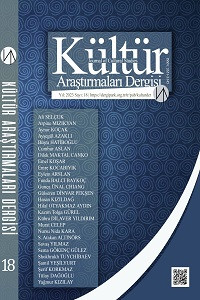Abstract
Ahmet Mithat uses his experiences and observations in social life as a source of inspiration for his novels and stories. He carries the sleuthing organizations, which were created with the main aim of keeping the state alive, to detect those who are operating against the state and to impose the necessary punishments on them, into the fictional world. In fact, he was arrested on April 6 and exiled to Rhodes on April 10, due to a critical article published in the İbret newspaper. One of the reasons for this was the close relationship he established with the Young Ottomans, and the other was the sleuths who interpreted this relationship in different ways and prepared reports. Ahmet Mithat, who did not give up journalism, which he saw as his main profession, even in the oppressive, political and political atmosphere created by the oppression period, calls censorship "the marten”. In fact, in order to take precautions against the activities of the spies, he constantly told his employees to be careful and that there should not be any holes in the henhouse, pointing to the troubles and difficulties of the current period. It is, of course, unthinkable for an artist who tries to turn everything he sees, hears and reads into a novel subject, not to mention them in his novels. For this purpose, it is the basis of the study to look at the sleuthing phenomenon in Ahmet Mithat's novels in the context of Taine's theory of "nation”, "environment” or "situation” and "time”.
References
- Ahmed Midhat Efendi (2010). Jön Türk. Haz. Osman Gündüz. Ankara: Akçağ Yayınları.
- Ahmet Mithat Efendi (2000a). Ahmet Midhat Efendi, Bütün Eserleri, Romanlar IX Cellât Esrâr-ı Cinâyât. Haz. Nuri Sağlam ve Ali Şükrü Çoruk. Ankara: TDK Yayınları.
- Ahmet Mithat Efendi (2000b). Zeyl-i Hasan Mellâh yahut Sır İçinde Esrâr. Haz. Ali Şükrü Çoruk. Ankara: TDK Yayınları.
- Aristoteles (2017). Poetika Şiir Sanatı Üzerine. Çev. Ari Çokona ve Ömer Aygün. İstanbul: Türkiye İş Bankası Kültür Yayınları.
- Gür, Murat (2019). Türk Romanında Erkeklik ve Milliyetçilik (1908-1923). İstanbul: Kesit Yayınları.
- İnci, Handan (2007). “Türk Romanında İlk Polisiye: Esrâr-ı Cinâyât”. Ahmet Midhat Efendi Kitabı. Ed. Mustafa Armağan. İstanbul: Beykoz Belediyesi Kültür Yayınları.
- İrtem, Süleyman Kani (1999). Abdülhamit Devrinde Hafiyelik ve Sansür Abdülhamid'e Verilen Jurnaller. İstanbul: Temel Yayınları.
- Pospelov, Gennadiy N. (1995). Edebiyat Bilimi. Çev. Yılmaz Onay. İstanbul: Evrensel Kültür Kitaplığı.
- Tanpınar, Ahmet Hamdi (1997). 19uncu Asır Türk Edebiyatı Tarihi. İstanbul: Çağlayan Kitabevi.
- Üyepazarcı, Erol (2002). “Türkiye'nin İlk Polisiye Roman Yazarı”. Kitap-lık, 54: 148-155.
- Yazgıç, Kamil (1940). Ahmet Mithat Efendi Hayatı ve Hatıraları. İstanbul: Tan Matbaası.
- Yeşilyurt, Şamil (2014). Ahmet Mithat Efendi'nin Romancılığı. Ankara: Akçağ Yayınları.
Abstract
Roman ve hikâyelerinin esin kaynağı olarak sosyal hayattaki tecrübe ve gözlemlerini kullanan Ahmet Mithat, devleti ayakta tutmak esas gayesiyle devlet aleyhinde faaliyette bulunanları tespit etmek, suçluların yakalanmalarını sağlamak ve onlara gerekli cezaları uygulatmak maksatlarıyla oluşturulan; ancak daha sonra amacından uzaklaşan hafiye teşkilatlarını bu yaklaşımla kurmaca dünyaya taşır. Hatta kendisinin de İbret gazetesinde yayımlanan bir tenkit yazısından ötürü 6 Nisan’da tutuklanıp 10 Nisan’da Rodos’a sürgüne gönderilmesine sebep olan faktörlerden biri Genç Osmanlılar ile kurduğu yakın ilişki ise diğeri de bu ilişkiyi farklı biçimlerde yorumlayarak rapor düzenleyen hafiyeler olmuştur. İstibdat döneminin oluşturduğu baskı dolu, siyasi ve politik atmosferde bile asıl mesleği olarak gördüğü gazeteciliği bırakmayan Ahmet Mithat, sansüre “sansar” ismini verir. Hatta hafiyelerin faaliyetlerine karşı önlem almak maksadıyla matbaada çalışanlarına sürekli olarak dikkatli olmalarını ve kümeste sansar girecek delik kalmaması gerektiğini söylemesi yaşanan dönemin sıkıntı ve zorluklarını işaret etmektedir. Gördüğü, duyduğu, okuduğu her şeyi roman konusu hâline getirmeye çalışan bir sanatçının bunları da romanlarında işlememesi elbette düşünülemez. Bu maksatla Taine’in muhit, ırk, zaman teorisi bağlamında Ahmet Mithat’ın romanlarındaki hafiyelik olgusuna bakmak çalışmanın esasını oluşturmaktadır.
References
- Ahmed Midhat Efendi (2010). Jön Türk. Haz. Osman Gündüz. Ankara: Akçağ Yayınları.
- Ahmet Mithat Efendi (2000a). Ahmet Midhat Efendi, Bütün Eserleri, Romanlar IX Cellât Esrâr-ı Cinâyât. Haz. Nuri Sağlam ve Ali Şükrü Çoruk. Ankara: TDK Yayınları.
- Ahmet Mithat Efendi (2000b). Zeyl-i Hasan Mellâh yahut Sır İçinde Esrâr. Haz. Ali Şükrü Çoruk. Ankara: TDK Yayınları.
- Aristoteles (2017). Poetika Şiir Sanatı Üzerine. Çev. Ari Çokona ve Ömer Aygün. İstanbul: Türkiye İş Bankası Kültür Yayınları.
- Gür, Murat (2019). Türk Romanında Erkeklik ve Milliyetçilik (1908-1923). İstanbul: Kesit Yayınları.
- İnci, Handan (2007). “Türk Romanında İlk Polisiye: Esrâr-ı Cinâyât”. Ahmet Midhat Efendi Kitabı. Ed. Mustafa Armağan. İstanbul: Beykoz Belediyesi Kültür Yayınları.
- İrtem, Süleyman Kani (1999). Abdülhamit Devrinde Hafiyelik ve Sansür Abdülhamid'e Verilen Jurnaller. İstanbul: Temel Yayınları.
- Pospelov, Gennadiy N. (1995). Edebiyat Bilimi. Çev. Yılmaz Onay. İstanbul: Evrensel Kültür Kitaplığı.
- Tanpınar, Ahmet Hamdi (1997). 19uncu Asır Türk Edebiyatı Tarihi. İstanbul: Çağlayan Kitabevi.
- Üyepazarcı, Erol (2002). “Türkiye'nin İlk Polisiye Roman Yazarı”. Kitap-lık, 54: 148-155.
- Yazgıç, Kamil (1940). Ahmet Mithat Efendi Hayatı ve Hatıraları. İstanbul: Tan Matbaası.
- Yeşilyurt, Şamil (2014). Ahmet Mithat Efendi'nin Romancılığı. Ankara: Akçağ Yayınları.
Details
| Primary Language | Turkish |
|---|---|
| Subjects | Modern Turkish Literature in Turkiye Field |
| Journal Section | Research Articles |
| Authors | |
| Publication Date | September 10, 2023 |
| Published in Issue | Year 2023 Issue: 18 |


